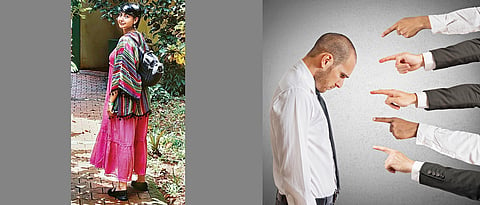

Shame -- all of us experience it at some stage or the other in life, and yet most of us fail to comprehend the factors that give rise to this unpleasant feeling and the impact it makes on our body and psyche. To give an insight into this, last week, Pune-based Soulsphere organised a therapist gathering where they discussed ‘Understanding shame and its role in therapy’. Led by Niharica Shah, a psychologist, and an expressive art therapy facilitator, the event focussed on understanding the concept and experience of shame, as well as its mechanism.
“An intense painful experience of inadequacy and isolation is what increases shame in many people. In this gathering, we are looking into how shame manifests in therapy, explore common causes of shame, and discuss a few important ways to tackle it in the therapeutic setting,” Shah said when we caught up with her prior to the gathering.
The session focused on making mental health professionals more aware and in tune with shame. It was about learning how to catch shame because it is something that comes in therapies all the time. “Shame is something that is really important to be understood and therapists at times completely avoid to speak about it as it is such an uncomfortable subject,” said Shah, who personally deals with people suffering from mental health issues, and develops mental health programmes for corporates.
“A lot of research shows that shame has been highly correlated with mental health conditions and issues like depression, anxiety, addiction, suicide, self-esteem, etc. If left unaddressed, it becomes more toxic and chronic. One of the best ways to combat shame is self-compassion. Research shows that self-compassion helps in developing shame resilience. Though it is a feeling which is hard to get rid of, we can develop tolerance against it,” Shah said adding that it helps to not get overwhelmed by it.
WHAT IS SHAME?
Shame is not just a word; it has a variety of meanings associated with it. It could vary from person to person. Shah described shame as a feeling of inadequacy. According to her, people feel that they are lacking in something. “When you experience this feeling, it becomes very toxic within yourself. Hence, you are on the lookout for good external environment to live in. But you should also look at the internal environment. When you bring in self-compassion as a tool, that is when the internal environment starts changing,” she pointed out.
However, some amount of shame is healthy because it is an indicator of your behaviour towards something, Shah pointed out.
She also differentiated shame and guilt saying that guilt has to do with something related to our actions. “When you do something wrong, you apologise and say, ‘I’m sorry, it was a mistake’. But when you feel shame, you say, ‘I’m sorry, I’m a mistake’. You start to believe that the wrongdoing has something to do with you and not your actions. It is important to open up about your feelings as shame thrives in secrecy,” Shah said.
Facing mental health issues is something not many people do courageously. And that is not because it is not in our culture or because of the stigma around it. It is because we are constantly creating links with the thought that we are not enough and then we can’t deal with it. This leads us to take major steps like hurting ourselves, Shah observed.
Speaking about the symptoms of people suffering from shame, she said, “Many times, people react very strongly in order to cover up their shame. The common reaction is anger. So the first step to fight your shame is identifying your triggers,” and added, “To identify others’ feeling takes a lot of work. Therefore, you need to first fight with your negative thoughts.”
There are both internal and external factors that affect people, Shah pointed out. “Your childhood, family background, schooling and peers play a major part in how you will deal with shame. At the same time, whatever you tell yourself also becomes you, so both internal and external factors matter in dealing with shame.”
Shah believes that there is a lot of difference in the way genders deal with shame. For a woman, shame is associated with the pressure to look great, do great and be great effortlessly. And that’s exactly what the expert is going to hold a session on this Women’s Day (March 8).
